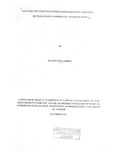| dc.description.abstract | In today's increasingly global economic environment, an organization's ability to tailor their products or services to worldwide markets has become essential for business sustainability and growth. The purpose of this study was to identify the internationalization strategies adopted by Indigenous Commercial Banks in Kenya as they internationalize and factors influencing internationalization strategy of the banks. The study used descriptive research design. The population in this research will be all the indigenous commercial banks in Kenya that have internationalized. According to the Central bank of Kenya Publication of 2010 statistics on bank shareholding in Kenya, there are thirty one locally owned and incorporated banks in Kenya (cf Appendix 1).
Nine banks were studied as a census because the entire population will be surveyed. Primary data collection method was used in this study. The data was collected using an interview guide, that is, a questionnaire, which had been developed by the researcher on the basis of the research questions. The questionnaires were delivered to the selected respondents by visiting them in the organization during which observation was done. Quantitative data collected was analyzed by descriptive statistics using SPSS and presented through percentages, means, standard deviations and frequencies. Content analysis was used on data that is qualitative nature or aspect of the data collected from the open ended questions.
The study concluded that the banks used decentralized services to suit specific markets to a moderate extent. The banks used degree of local responsiveness, that is, services tailored for specific markets in planning and executing the bank's operations abroad to a moderate extent. The study further concluded that the banks used attractive overseas markets to influence internationalization to a moderate extent. Liberalization in foreign market and domestic regulation to influence internationalization was used to a moderate extent. The study further concluded that the banks used regulations governing financial sector to influence internationalization to a moderate extent. The study recommended the banks to use decentralized services to suit specific markets.
The banks were recommended to use degree of local responsiveness, that is, services tailored for specific markets in planning and executing the bank's operations abroad as this would increase the banks market share by adding the specific markets. The study further recommends that banks use attractive overseas and liberalization in foreign market and domestic regulation markets to influence internationalization. This would help in increasing the banks foreign market share. The study further recommends the banks to take advantage of regulations governing financial sector to influence internationalization. The banks should lower cost of operations, call centers and global distribution channels to make it easier to operate globally. | en_US |

